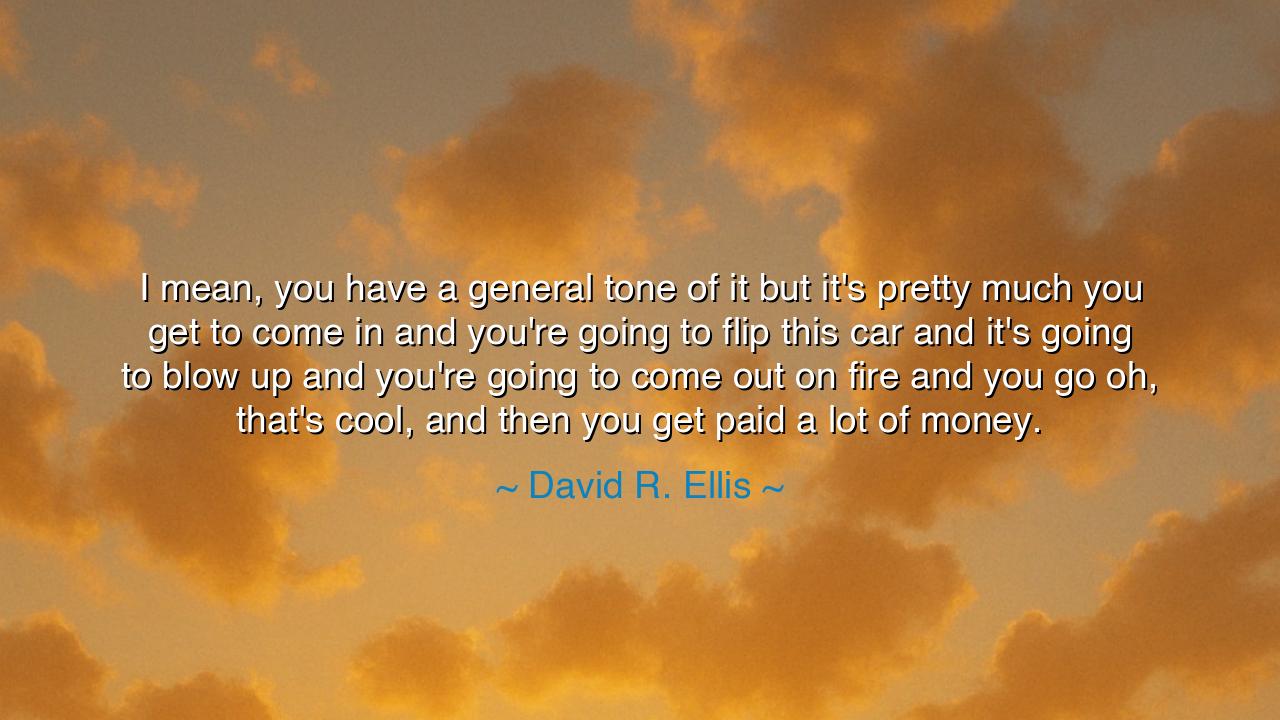
I mean, you have a general tone of it but it's pretty much you
I mean, you have a general tone of it but it's pretty much you get to come in and you're going to flip this car and it's going to blow up and you're going to come out on fire and you go oh, that's cool, and then you get paid a lot of money.






In the words of David R. Ellis, we are confronted with a reflection on the adrenaline-driven nature of certain professions—specifically in the world of action filmmaking. Ellis describes a moment of high stakes, where one is asked to perform dramatic stunts—such as flipping a car and emerging from the explosion on fire—for the thrill, the spectacle, and of course, the reward. This kind of work, while physically demanding, is often more about fulfillment in the moment than the enduring legacy of the work itself. There is a sense of exhilaration that comes with the risk, the action, and the instant gratification, yet it also speaks to a deeper truth about human nature: we are driven by the desire to feel alive, to push boundaries, and to experience thrills that stir the soul. Ellis’s words highlight the tension between the temporary excitement of such stunts and the deeper, often unspoken question of purpose.
This idea of thrilling action in exchange for reward is not a modern one, but a concept deeply embedded in the human experience. In ancient times, warriors, adventurers, and heroes sought fame and glory through heroic deeds—whether through battle, conquest, or the pursuit of glory. Hercules, in his legendary twelve labors, faced challenges that pushed him to the brink of physical and mental endurance. Each task he completed, while bringing him closer to his own immortality, was filled with moments of high risk and danger. Just as Ellis describes the thrill of performing stunts in the moment, the ancient heroes found themselves exhilarated by their feats, knowing that each challenge they overcame brought them closer to their goals, and, often, their reward.
Consider the gladiators of ancient Rome, who fought in the arenas for the entertainment of the masses. The very essence of their profession was tied to the dangerous spectacle of combat. These men, though slaves or prisoners of war, gained fame and wealth for their ability to perform in the arena. Each fight they entered was a gamble with their lives, but it was also a path to glory. In a way, their experiences echo the thrill Ellis describes—the exhilarating rush of risking it all for a reward that came swiftly but was often short-lived. The price they paid for that brief moment of fame was their freedom and sometimes their lives, yet for those who survived and triumphed, the payoff was great. Their stories were retold for centuries, just as the stunts in modern action films are remembered.
Ellis’s description is also a reminder of how modern entertainment often mirrors these ancient pursuits, not in terms of life-or-death stakes, but in the excitement, the reward, and the fleeting nature of the moment. For those who take part in these high-octane spectacles, there is a sense of satisfaction in the moment, but also a recognition that the thrill is temporary. In the world of film, as in ancient times, the reward for taking such risks is not only the money and the fame but the pleasure of being a part of something grand—a show that captivates and excites the masses. It is a recognition that true glory often comes from the spectacular feats that captivate the imagination, even if only for a short time.
However, Ellis’s reflection also hints at a deeper question: what does it mean to live a life of purpose? The modern world, much like the ancient world, is filled with individuals who seek glory, excitement, and fame, but how many truly find fulfillment in their achievements? While performing a stunt, the exhilaration may feel like a profound reward, but it is in the long-term impact of our actions that true meaning is often found. Heroes of the past, like Alexander the Great, achieved great feats that altered the course of history, but their legacy was not in the thrills they experienced but in the lasting effects of their actions on future generations. It is worth considering: is the pursuit of momentary thrills and rewards enough, or is there a deeper, more enduring fulfillment in the work we do?
The lesson here is twofold. First, we are reminded that the pursuit of exhilaration, the chase for thrills, and the drive for reward are deeply human desires that can shape our choices and experiences. Whether it is the pursuit of fame, glory, or personal satisfaction, we all seek to experience moments that make us feel truly alive. However, second, Ellis’s words also caution us to reflect on the transience of such rewards. While the adrenaline of the moment is undeniable, it is the deeper impact of our actions—the legacy we leave and the meaning we create—that ultimately gives life purpose. Just as the ancient heroes left behind stories that endure to this day, so too must we consider how our actions shape the world beyond the immediate rush of the moment.
In our own lives, let us embrace the exhilaration of the experiences that challenge us, that excite us, and that push us to grow. But let us also recognize that true fulfillment is not found in fleeting moments of thrill but in the long-term effects of what we contribute to the world. Whether in our careers, relationships, or creative endeavors, it is not the immediate reward but the lasting impact we create that will endure. In every challenge we face, let us ask ourselves: will this moment of excitement lead to something greater, something that endures beyond the fleeting rush?






AAdministratorAdministrator
Welcome, honored guests. Please leave a comment, we will respond soon